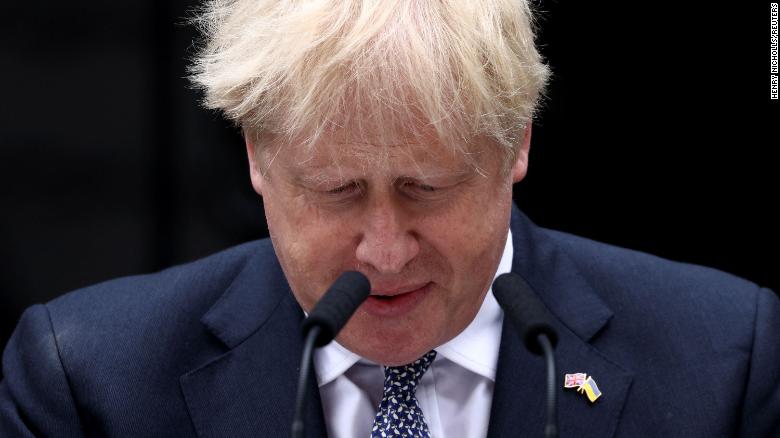
London (CNN) – The next prime minister of the United Kingdom will inherit a mess that some members of the governing Conservative Party believe will be impossible to manage.
With just six weeks until Boris Johnson’s successor walks through the famous black door of 10 Downing Street, the two remaining candidates are making a bad situation worse by rubbing acid into the wounds of a party so badly divided it could be forced to call an early election and hope for the best.
For the purposes of this article, CNN spoke with multiple sources across the Conservative Party on the condition of anonymity.
There are a few reasons for this, starting with how the new prime minister will be chosen.
Johnson’s replacement will not be elected by the 47 million adults registered to vote, but by a much smaller group of around 160,000 grassroots Conservative Party members. The winner will be announced on September 5.
This is constitutionally quite proper. In the UK, prime ministers are not elected directly. Instead, members of parliament are elected and the leader of the party with the largest number of MPs conventionally forms a government. The Conservatives still enjoy a healthy majority from Johnson’s 2019 election win, so his successor simply inherits that majority and takes over as the head of government.
It does, however, create a bizarre dynamic in which the two candidates remaining — Liz Truss and Rishi Sunak — must spend the next few weeks traveling the country and appealing to the priorities of an electorate that represents less than 0.5% of the voting public.
This means running on campaign issues that the candidates believe are most likely to appeal to this very small and hardly diverse group of people.
“The average age of a party member is late 50s. Just under half are of a pensionable age and they are predominately White,” says Tim Bale, who is professor of politics at Queen Mary University of London and has studied the Conservative Party extensively.
“They mostly live in southern England and are (financially) comfortable. They support a strong line on law and order, they approve of low taxes but believe that public services are important and should be funded properly, especially schools, police and, of course, the health service,” Bale adds.
Unsurprisingly, given the cost-of-living crisis, the main issue of debate has been how to handle the economy. Truss is calling for a different approach from Johnson’s tax rises, and claims that cutting taxes immediately would create growth. Sunak argues that he believes this is fantasy economics, given the UK is still recovering from the economic shock of the Covid-19 pandemic.
This all might sound rather tame until you consider that Sunak was Johnson’s Chancellor of the Exchequer, or finance minister. A narrative has now emerged among Truss supporters that although she was in Johnson’s cabinet as his Foreign Secretary, she was the person most opposed to what are now being painted as Sunak’s tax rises — rather than those of his boss, Johnson.
This all gets even messier when you consider the past few weeks of British politics and just how personal the battle between Truss and Sunak has become.
Many Johnson allies claim that Sunak’s resignation over a sexual assault scandal involving Johnson’s deputy chief whip was a calculated move to topple Johnson so that he could have a shot at the top job.
“Rishi was clear in his letter the reasons why he resigned. Enough was enough,” a Sunak campaign spokesperson told CNN.
Johnson’s main allies have since piled in to support Truss as the anti-Sunak candidate and are briefing aggressively against Sunak, echoing the line that he was responsible for the government’s economic failures.
“They are trashing our record in government on stuff she voted for in the cabinet,” says an MP who is one of the few Johnson loyalists to support Sunak.
“It’s one thing to say we need a new direction; it’s another to ridicule our record and say anyone who supports Rishi is making a mistake. If they carry on like this, they will really struggle to unite MPs if they win,” the lawmaker adds.
It’s this issue of whether or not Sunak or Truss can unite MPs in a way that makes it possible to govern that is freaking out many Conservatives.
“The top three candidates each had around a third of the parliamentary party supporting them. They have each offered a very different version of where the party should be going,” Salma Shah, a former Conservative and government adviser, tells CNN. “This will make life difficult for any new whips’ team who will need to bridge the gap. A job made harder by the fact the teams seem to have been tearing chunks out of each other in the press and on TV.”
On top of the brutal fight taking place between the two candidates looms the enormous figure of the outgoing Prime Minister. Lots of MPs continue to believe that Johnson was still the Conservative Party’s best shot of winning the next general election and that his treatment from people like Sunak was unforgivable.
One veteran MP who joined parliament just after Margaret Thatcher was forced to resign told CNN: “I am worried. Back then the people who stabbed her in the back and the people who remained loyal was such a clear dividing line that defined the party for years. Things are even more complicated now and I am not sure these two (Sunak and Truss) can bridge those gaps.”
Seconds after it was decided the final two were Truss and Sunak, an even less optimistic Conservative MP told CNN: “We’ve just lost the next election.”
It’s worth noting that some Conservatives, especially those surrounding Truss, are optimistic that MPs will unite when push comes to shove and the party faces the real prospect of losing power. They argue that the opposition Labour party would wreck the UK’s economy and that the next Conservative government would have to fix it. That alone is worth swallowing their pride and fighting for.
That said, it’s an undeniable truth that whoever wins the contest inherits what is currently an unstable parliamentary majority and 12 years of Conservative power in which the country has seen four prime ministers and even more iterations of the Conservative Party.
Both candidates served in Johnson’s scandal-ridden government — and it’s worth noting that Johnson himself will still be a sitting MP when either takes over, looming large over British politics from the backbenches.
Just as Edward Heath sniped at his successor Margaret Thatcher during her premiership in the 1980s, Thatcher did the same to John Major in the following decade. Theresa May slammed Johnson over the “Partygate” scandal, so the next PM will likely be braced for criticism from Johnson — especially if he resumes his previous career as a newspaper columnist.
The job of reinventing and uniting the party, which has been struggling in the polls for months and publicly flagellating itself for almost as long, would be tough for anyone. It will be even harder for either of the leadership contenders, both of whom have their hands dirty from previous government jobs and whose supporters have been flinging mud at one another over a long, hot summer.
And if the warring factions cannot overcome these differences, they may find that they’ve wrecked their own chances of staying in power and hand the keys over to an opposition party that’s been locked out of Downing Street since 2010. The stakes are that high, but very few in the Conservative Party are behaving like they understand that this is the case.




